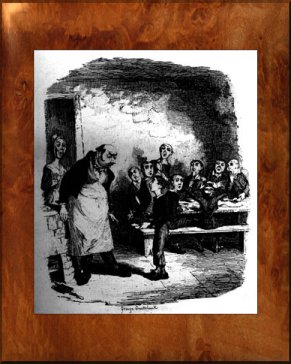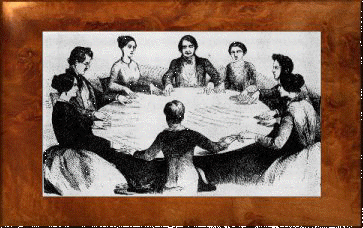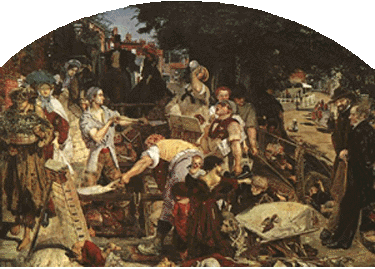|
|
-

- 1810s
- Luddite Riots in Yorkshire & other towns as workers protest loss
of jobs in newly mechanized factories.
Report:
"The Luddites: Backdrop to Mary Barton" by Felix
Silverio
Enclosure Acts allow landowners to forbid the traditional farming of
their land by "squatter"/farmers.
-
- 1815
- Corn Laws passed protecting home agriculture imposing duty on
imported grain. Food prices rise.
Wellington defeats Napoleon at Waterloo.
Cotton mills employ thousands in North England; Horrocks of Preston
employs 700 spinners plus 6,000 piece or slopworkers working at home.
Report:
"The Working Classes in Victorian Times" by Felix Silverio
-
- 1817
- "March of the Blanketeers" from Manchester to London
halted at Stockport.
-
- 1823
- The first Mechanics Institutes open (see Mary
Barton, p. 136.)
-
- 1824
- The Combination Acts make Trade Unions illegal.
-
- 1825
- Combination Acts repealed, though repression of trade unions
continues.
-
- 1829
- Act of Parliament institutes effective police force in London,
replacing the Bow Street Runners.
Report:
"Crime and Its Popular Manifestations in the 19th Century"
by Lea Smalls
-
- 1832
- First Reform Bill passed, enfranchising upper-middle classes. Voters
increase from 500,000 to 1 million.
Britain occupies Falkland Islands.
-
- 1834
- The New Poor Laws passed replacing Out of Door or Parish Relief with
financial aid provided only to those who entered a workhouse requiring
"make-work" projects at less than minimum wage, sexes were
segregated, & parents lost all right to see their children. (this
part of the law changed in
1842.)
Report:
"Parish Relief and The Workhouse" by Cathleen Edgar
 Grand
National Consolidated Trade Unions led by Robert Owen form in January;
collapse by October. Grand
National Consolidated Trade Unions led by Robert Owen form in January;
collapse by October.
South Australia Act establishes British colony there.
Daniel O'Connell's motion to repeal union with Great Britain defeated
523 to 38.
"Ode to the Advocates for the Removal of Smithfield Market"
and "I'm going to Bombey," "A True Story" and
"Ode to Mr. Malthus" etc. published by Thomas Hood.
Sixth "Kaffir" War between white settlers & Bantu in
South Africa.
- 1837
- Workingmen's Associations formed, and "The People's
Charter" initiates first national working class movement for
suffrage and worker's rights (Chartism). [See Prefatory Note to Mary
Barton].
Victoria becomes Queen of England. Rules until 1901.
US Congress passes "Gag Law" aimed at suppressing slavery
debate.
-
- 1838
- First wave of Chartism: push for universal suffrage.
Anti Corn Law League formed on behalf of free trade.
Bestseller Oliver
Twist begins in monthly installments in Bentley's
Miscellany. Runs February
1837 to March 1839.
Charles Dickens attends 4 Mesmeric demonstrations
Report:
"Phrenology, Mesmerism and Spiritualism" by Paul Roach
 The
National Gallery opens in London. The
National Gallery opens in London.
Daguerre presents new method of photography to Academie des Beaux Arts
in Paris.
First travelling post office runs between Birmingham & Liverpool.
-
- 1839
- Outbreak of first Opium War between Britain & China (lasts until
1842).
Report:
"The Social Ramifications of Opium Use in 19th Century
London" by Lea Smalls
Edgar Allen Poe publishes "The
Fall of the House of Usher."
Charles Goodyear Patents process for "vulcanized" rubber.
-
- 1840
- Queen Victoria marries Prince Albert of Saxe-Coburg-Gotha.
James Fenimore Cooper's "The Pathfinder" is a US best
seller.
Pierre Joseph Proudhon announces "La propriété, c'est le vol":
Property is Theft.
Admiral Nelson's Column in Trafalgar Square is erected.
Thackeray's "Going to See a Man Hanged" appears in the July
1840 issue of Frazer's.
Massachusetts, Connecticut & Pennsylvania begin limiting hours of
employment of minors in textile mills.
British-Afghan War is ended.
British policy of transporting criminals to New South Wales is ended.
(See Great
Expectations).
Penny postage established in Great Britain.
2,816 miles of railroad in operation in the US; 1,331 in England.
-
- 1841
- Lord Melbourne (Whig) resigns as Prime Minister; Sir Robert Peel
(Tory) succeeds him.
London humorous periodical Punch begins to appear.
PUNCH:
A History Project This is a website created by undergraduate
students in Professor Anthony Wohl's senior seminar at Vassar
Poe's "The
Murders of the Rue Morgue," his 1st detective story, appears
in Graham's.
Great Britain has 18.5 million people; US 17 million; Ireland 8
million.
New Zealand becomes a British colony.
Proportion of labor force in industry has risen from 25% in 1770s to
40% in 1840s.
-
- 1842
- Strikes and riots in industrial Midlands (Manchester) in
July/August.
First of "blue books" commissioned by parliamentary
investigatory committees report on working conditions, pauperism,
sanitation, etc. (See some of them on reserve)
Thomas Carlyle scribbles out Past and Present
in a matter of weeks in response.
Report:
"The Religious Climate of Victorian England" by Jimmy Yi
"The Hungry 'Forties'" are in full swing.
Queen Victoria makes her first railroad trip, Windsor to Paddington.
Tennyson's "Locksley
Hall" (Begun 1837-38); also his "Ulysses"
(begun 1833).
- 1843
- Thomas Hood's "Song
of the Shirt" appears in Punch;
Wordsworth is poet laureate.
American reformer Dorothea Dix reveals to Mass. legislature shocking
conditions in prisons and asylums.
Maori revolt in New Zealand against British colonials.
-
- 1844
- Ralph Waldo Emerson's Essays,
2nd series published.
John Stuart Mill's Essays on some Unsettled Questions of
Political Economy.
Report:
"Bentham's Utilitarianism in Victorian England" by Paul
Roach
Daniel O'Connell found guilty of conspiracy against British rule in
Ireland.
William Thackery publishes Barry Lyndon.
Turner's painting "Rain, Steam and Speed" at the Tate in
London.
"Spring"and "Ode Imitated from Horace" by Thomas
Hood published.
- 1845
- Texas & Florida become states of the US.
Friedrich Engels' "The
Condition of the Working Class in England" published in
Leipzig.
Compound steam engine patented; machine for combing cotton and wool
patented.
Anglo-Sikh wars begin in India.
-
- 1846
- Dickens's Dombey
and Son begins serial publication in October. Runs to April 1848.
Famine in Ireland caused by failure of potato crop.
Reports on "The
Irish in England" by Lisa Connell
"Irish
Emigration" by Mary Johnston
Iowa becomes state of the US.
Melville publishes Typee.
"The Daily News," the first cheap English newspaper,
appears. Charles Dickens is its editor.
-
- 1847
- Charlotte Brontë's Jane
Eyre; Emily Brontë's Wuthering
Heights appear.
British Factory Act ("The Ten Hours Bill") restricts working
day for women and children between
the ages of 13 and
18 to "no more than 10 hours per day." [See Mary
Barton, p.129.
-
- 1848
- Revolutions all over Europe: Paris, Vienna, Venice, Berlin, Milan,
Parma.
First US women's rights convention at Seneca Falls, NY.
The Evangelical Alliance founded in London
Report:
"The Religious Climate of Victorian England" by Jimmy Yi
Elizabeth Gaskell publishes Mary
Barton.
Thackeray's "Irish Gems" from "Benighted Irishman"
in Punch,
April 1848.
John Stuart Mills Principles
of Political Economy; Marx's Communist
Manifesto.
Gold discoveries in California lead to first gold rush.
-
- 1849
- Henry Mayhew's sketches of city life begin publication in The
Morning Chronicle.
Report:
"The Housing Question" by Deb Taft
Disraeli leads British Conservative Party; Revolts in Dresden and
Baden.
Dickens's David Copperfield; Charles Kingsley's Alton
Locke;
Dostoevsky sentenced to death; commuted to penal servitude in Siberia.
Bedford College for women founded in London.
-
- 1850
- California becomes a US state. Emerson's "Representative
men"; Hawthorne's Scarlet
Letter published.
Herbert Spencer's Social Statistics: beginning of
sociology.
Population of US is 23 million; 3.2 million slaves in US.
Thackeray's "The Sights of London" appears in Punch
(April) and his "M. Gobemouche's Authentic Account of the Grand
Exhibition" published.
-
- 1851
- Melville's Moby
Dick appears, and is unfavorably received in England; Ruskin's The
Stones of Venice appears.
Ten towns in Great Britain reach population exceeding 100,000: London,
Liverpool, Glasgow, Manchester Birmingham, Leeds, Edinburgh, Bristol,
Sheffield, & Bradford. One half of the population now lives in
towns rather than rural areas.
Report:
"The Housing Question" by Deb Taft
Isaac Singer invents continuous stitch sewing machine.
Mary Carpenter's "Reformatory Schools for Juvenile
Offenders" published.
The New York Times begins; Maine & Illinois begin
Prohibition.
Thackarays's "Panorama of the Ingleez" published in May,
1851.
Basuto War begins between Britain & native South Africans; lasts
until 1853.
Victoria, Australia proclaimed separate British colony.
The Great Exhibition begins in London in the Crystal Palace.
-
- 1852
- Dickens's Bleak House is published.
Paddington Station designed by Brunel & Wyatt; Schumann's
"Manfred" performed at Weimar.
Matthew
Arnold's "The
Buried Life" and "Lines
Written in Kensington Gardens."
Second Burmese War is fought; British annex Pegu, & also Mahratta
State of Nagpur, India.
-
- 1853
- Hypodermic syringe invented by Alexander Wood; Compulsory
vaccination against smallpox in Britain.
Report:
"The Social Ramifications of Opium Use in 19th Century
London" by Lea Smalls
Queen Victoria allows chloroform to be used on her for birth of 7th
child, thus promoting anaesthetic use.
-
- 1854
- Thoreau's Walden is published; Republican Party formed
in US.
Juvenile Offender's Act is passed in Great Britain.
Report:
"Education in the Nineteenth Century" by Deb Taft
University College Dublin founded.
Pope Piux IX declares Immaculate Conception an article of faith.
WorkingMen's Colleges founded in London by F.D. Maurice.
British & French ally against Russia in Crimean War.
Elizabeth Gaskell's North
and South begins serial publication in Dickens's Household
Words. Runs from September 1854 to January 1855.
-
- 1855
- Walt Whitman's Leaves
of Grass published.
Matthew Arnold's "Stanzas
from the Grande Chartreuse" (begun 1852?).
Britain & Afghanistan join against Persia; Britain annexes Oudh,
India; establishes Natal as a British colony in South Africa.
-
- 1856
- London Chartist Debates carried on. [See Schaffer 206]
Pure cocaine extracted from cocoa beans.
Big Ben, 13.5 ton bell at Parliament, cast at Whitechapel Bell
Foundry.
Longest bare-knuckle boxing match in history: James Kelly vs. Jack
Smith at Melbourne, Australia. Match lasts 6 hours & 15 minutes.
Britain begins Anglo-China war; British fleet bombards Canton.
Persia occupies Herat-British-Persian War begins.
-
- 1857
- The Married Woman's Property Act passed.
Indian mutiny against British Rule.
Report:
"The Colonies in Victorian Fiction" by Lisa Connell
Seige of Delhi; British enter Cawnpore.
British fleet destroys Chinese and take Canton.
Irish Republican Brotherhood (Fenians) founded.
-
- 1859
- John Stuart Mill's On
Liberty; Darwin's Origin of Species by Natural Selection
published.
Samuel Smiles' Self Help manual on how to succeed in
life published.
- Building of the Houses of Parliament completed.
Baseball becomes popular in NY & Boston; 1st recorded game in San
Francisco.
-
- 1861
- Mrs. Beeton's Book of Household Management published.
Confederate States of America formed.
Prince Albert dies.
First horse-drawn trams appear in London; Daily weather forecasts
begun in Britain.
-
- 1862
- Herbert Spencer's First Principles published.
R.J. Gatling invents gatling gun; Red Cross founded.
-
- 1863
- Lincoln issues Emancipation Proclamation.
UMass Amherst founded.
John Stuart Mill's Utilitarianism
published.
-
- 1864
- The Contagious Diseases Act passed. Prostitutes could be stopped by
plainclothes police and required to submit to physical examination for
venereal disease. Report:
"Nineteenth Century Medicine" by Grace Kelley
Reports on "Prostitution":
"The
Fallen Woman..." by Megara Bell
"Prostitutes
in Victorian England" by Michele McPhee
-
- 1865
- US Civil War ends; 13th Amendment abolishes slavery; Klu Klux Klan
founded.
John Ruskin publishes Sesame and Lilies.
-
- 1866
- Alfred Nobel invents dynamite.
First professional golf championship held, in Scotland. Game comes to
US in 1885).
John Ruskin publishes The Ethics of the Dust and The
Crown of Wild Olive.
-
- 1867
- Matthew Arnold's "Dover
Beach" appears.
914,000 people emigrate from Ireland to US; 424,000 from Britain
between 1857 and 1867.
Report:
"Irish Emigration" by Mary Johnston
Fenian outrages in Ireland and in Manchester.
British Parliament passes the Second Reform Bill, expanding suffrage.
-
- 1868
- Wilkie Collins's The
Moonstone, on of the first detective novels published.
First regular Trades Union Congress held at Manchester.
British send armed expedition to Ethopia; capture Magdala.
-
- 1869
- Matthew Arnold publishes Culture and Anarchy and John
S. Mill, On
the Subjection of Women.
Report:
"The Victorian Novelist as Victorian Sage" by Jimmy Yi
British Debtor's Prisons are abolished.
Francis Galton's treatise "Hereditary Genius" on eugenics
published.
-
- 1870
- Vatican promulgates doctrine of papal infallibility.
England population is 26 million; US 39 million; Ireland 5.4 million.
Ireland has, that is, 2.6 million fewer people than it had in
1841.
-
- 1871
- British Act of Parliament legalizes labor unions.
George Eliot's Middlemarch
published.
British annex diamond fields in Kimberly, South Africa.
-
- 1872
- Voting by secret ballot becomes law in Britain.
Samuel Butler's Erewhon published.
-
- 1874
- First impressionist exhibition, inspired by Monet, opens in Paris.
British annex the Fiji Islands.
-
- 1875
- Public Health Act passed in Britain.
Prince of Wales visits India.
Britain buys 176,602 Suez Canal shares from Khedive of Egypt.
Mark Twain publishes Tom
Sawyer.
Construction is completed on London's first main sewerage system.
-
- 1876
- Alexander Graham Bell invents the telephone.
Reformatory for juvenile offenders is founded at Elmiry, NY.
-
- 1877
- Henry James' The
American is published.
Queen Victoria is proclaimed Empress of India.
-
- 1878
- Electric street lighting is introduced in London.
-
- 1879
- Henry George's Progress and Poverty is published. Far
more popular than Marx.
London's first telephone exchange established; Australian frozen meat
for sale in London Markets.
British Lord W.L. Blackley proposes a scheme for old age pensions.
British/Zulu Wars are being fought in South Africa.
-
- 1880
- Parcel post introduced in England; first electric street lights in
NY.
17,900 miles of railroad track in England; 87,800 in US.
The Transvaal declares itself independent of Britain and South Africa.
-
- 1881
- London city population is 3.3 million; NY is 1.2 million.
-
- 1882
- London Chamber of Commerce is founded.
Kilmainham agreement between Parnell and British Government; Fenians
murder Lord Frederick Cavendish and T.H. Burke in Phoenix Park,
Dublin; British occupy Cairo, Egypt.
-
- 1883
- First skyscraper is built. In Chicago, it is 10 stories high.
Buffalo Bill organizes first "wild west" show; Brooklyn
Bridge opens for traffic.
Britain decides to evacuate the Sudan.
-
- 1884
- John Ruskin delivers "The Storm-Cloud of the Nineteenth
Century" at the London Institution, February 4,
1884, the product of his recorded observations on the condition of the
skies over London over a period of 50 years.
-
- 1885
- Britain establishes "Protectorate" over N. Bechuanaland,
Niger River region, & South New Guinea; also occupy Port Hamilton,
Korea.
-
- 1886
- Prime Minister Gladstone introduces Home Rule Bill in Ireland.
Charles Booth's Life and Labour of the People of London
concludes that 30% of all full-time workers in York are earning
below poverty wages.
-
- 1887
- Margaret Oliphant's The Land of Darkness published in
Blackwood's Edinburgh Magazine for January,1887.
Queen Victoria celebrates her Golden Jubilee.
Sir Arthur Conan Doyle publishes 1st story, "A
Study in Scarlett."
-
- 1888
- Jack the Ripper murders six women in London.
Matabele King accepts British protection & grants Cecil Rhodes
mining rights in SA.
Oscar Wilde's Picture
of Dorian Gray is published.
First electrical power station opened in Deptford, England.
-
- 1891
- The Adventures of Sherlock Holmes published in Strand
magazine.
"Rerum novarum," Papal encyclical on the condition of the
working class.
-
- 1892
- Israel Zangwill publishes his novel, Children of the Ghetto.
Walt Whitman and Alfred Lord Tennyson die.
George & Weedon Grossmith's Diary of a Nobody, a
satire on clerk and white color poverty, appears.
Iron and steel workers strike in US.
Sigmund Freud publishes "A Case of Successful treatment of
Hypnotism."
-
- 1893
- Independant Labor Party formed in England.
-
- 1894
- Thomas Alva Edison opens his Kinetoscope Parlor, New York.
-
- 1895
- H.G. Wells' The
Time Machine is published.
W.B. Yeats's Poems appear.
Art noveau style predominates.
Tchaikovsky's "Swan Lake"; Mahler's Symphony #2.
First professional football game in US played, in Latrobe, PA.
-
- 1896
- Arthur Morrison's A Child of the Jago published.
Niagara Falls opens.
First all-steel building in England: West Hartlepool.
National Portrait Gallery moved from Bethnal Green to Westminster.
"Persimmon", the Duke of Windsor's horse, wins the Derby.
-
-
 
 |
|
|
|
|
           
|